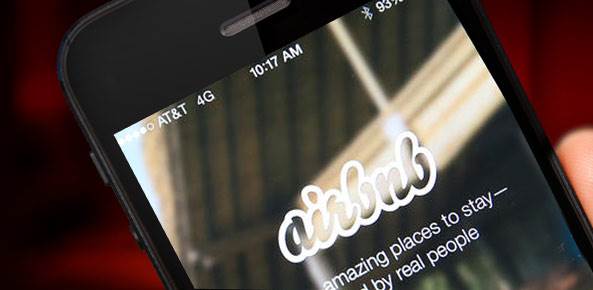
Positioning itself to take over the travel industry, Airbnb on Thursday said that for the first time, travelers will be able to use the site to do more than book a place to stay.
Tourists now can use Airbnb’s new Trips platform to book adventures hosted by locals — anything from a whiskey tasting, to a dirt biking trip, to a truffle hunting excursion. Soon the site will expand to let users make restaurant reservations while they travel, and eventually, Airbnb plans to start booking flights.
With the announcement, the startup that introduced the world to home sharing nearly 10 years ago — an explosive phenomenon that has since threatened to upend the hotel industry and the rental markets in major cities across the U.S. — has made a major leap toward its goal of owning every aspect of the travel experience.
The launch sets San Francisco-based Airbnb, a $30 billion company with 3 million short-term rental listings around the world, on stronger footing to compete with Expedia and other top tourism industry players. It also could sweeten a potential initial public offering next year.
“For many people, travel is easy, but it’s not magical,” said co-founder and CEO Brian Chesky, “and if you want to have an amazing trip you end up basically in a research project. … Pretty soon you can literally spend as much time planning your trip as on your trip. So we want to fix this.”
The changes come as Airbnb is fighting challenges on the home-sharing front. In cities including San Francisco and New York, Airbnb is locked in legal battles with regulators over rules designed to prevent a frothy short-term rental market from driving up prices for local residents. And the startup faces increasing competition from traditional travel industry players. Priceline’s Booking.com now offers home and apartment rentals, and Expedia acquired home-sharing site HomeAway last year and is working on integrating its listings.
Experts say the push to become a full-service vacation booking site is a natural one for Airbnb — it’s the same path Expedia and other competitors followed. But Airbnb’s expansion could mean trouble for the rest of the travel industry.
“Long-term it’s a big threat to Expedia, Kayak, Booking,com, TripAdvisor,” said Robert Birge, who has worked at Kayak and Orbitz and now is chief marketing officer of Lola, a Boston-based on-demand travel service.
If the hotel industry is any indicator, Airbnb could become a major source of disruption for travel booking sites.
The New York City lodging industry lost about $2 billion to Airbnb from September 2014 through August 2015 — $451 million directly and the rest in ancillary losses on food and beverage sales, construction jobs and other areas, according to a report by hospitality consulting firm HVS.
Airbnb’s new feature, called Experiences, rolled out in San Francisco and 11 other cities Thursday. Experiences, which must be preapproved by the company, can last a few hours or several days, and include volunteer opportunities and educational trips. The idea is to provide a personalized experience — a tourist with a passion for painting, for example, might choose to spend the day with a local professional painter.
“This is the most significant change since they rented that room for the first time and built the first version of the app,” Alex Schleifer, Airbnb’s head of design, said in an interview following the announcement.
Airbnb has been working on Trips for two years, and rumors of its release have been spreading for several months. On Thursday the company finally unveiled the new features in a keynote speech at the three-day Airbnb Open conference in Los Angeles.
Experiences found a warm reception with many Airbnb landlords at Thursday’s event.
“This is kind of a challenge for hosts to develop deeper relationships with their guests. To connect with them a little bit more,” said Kevin Lindsay, an Airbnb user who rents three bedrooms of the San Francisco apartment he shares with partner Adrian Santos.
The couple already invites some guests to dinner or for excursions to the nearby Russian River. But Lindsay is brainstorming ideas for formal experiences, such as a multiday bicycling and camping trip.
Airbnb’s expansion into this new territory reflects a common Silicon Valley blueprint for success. None of the area’s most influential companies stopped innovating after one successful product, said Rishi Garg, a partner with Silicon Valley venture capital firm Mayfield. Uber seems to recognize that rule as well, judging by the recent debut of its its stand-alone delivery service, UberEats.
“You’ve got to develop the capability to have more than one hit,” Garg said.
Airbnb on Thursday also launched a new meetup feature for travelers and a series of guidebooks with content curated by locals. Audio walking tours will be coming to San Francisco this spring, and Airbnb eventually plans to begin integrating other services, such as grocery delivery, into its home stays.
“This is literally just the beginning,” Chesky said.
Still, activity booking poses different challenges than home sharing, said TJ Sassani, founder and CEO of San Francisco-based activity-booking startup Zozi. With the peer-to-peer model in particular, it’s difficult to find enough hosts who have interesting experiences to offer, he said. And it raises liability questions — if travelers book a kayak adventure with their Airbnb host, how do they know the boat is safe and their guide is trained?
Airbnb says it has a five-step vetting process to make sure experiences are safe.
Of course, the company’s well-known brand and huge existing customer base give it an edge in the market.
“There’s probably only one company on Earth who could make the peer-to-peer business work,” Sassani said, “and that would be Airbnb.”
© 2016 San Jose Mercury News under contract with NewsEdge. -.







